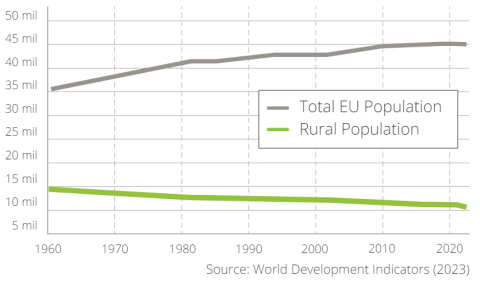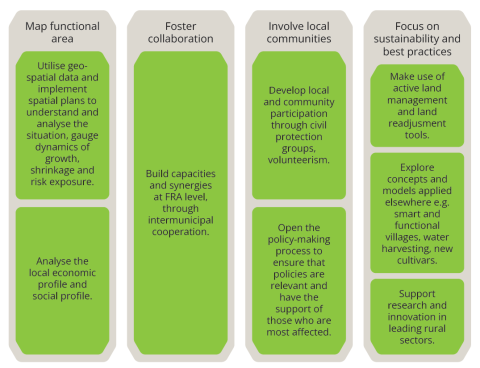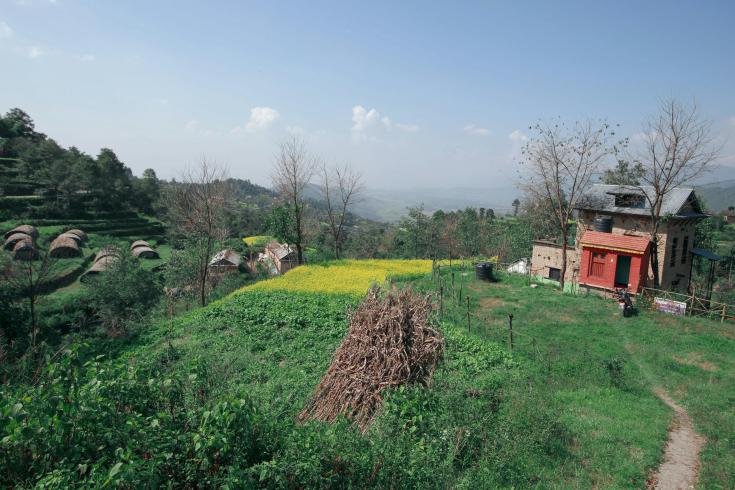Policy brief on environmental risks in rural areas
Following our first year of activities, including our first Thematic Report, we have developed a set of recommendations to address challenges faced by rural areas across Europe regarding environmental risks related with depopulation and ageing population in rural areas, highlighting the need for comprehensive policies that address these multifaceted challenges.
Depopulation, climate change and rural development

While the overall population of the European Union continues to grow, a contrasting trend emerges in rural areas where populations are steadily declining. A decreasing and ageing population in rural areas influences the ability to mitigate environmental risks associated with climate change.
Abandoned or underutilised agricultural land is more susceptible to environmental degradation, soil erosion, and reduced biodiversity. Additionally, the dwindling population might result in decreased community engagement in environmental conservation efforts, hindering the implementation of sustainable practices.
The initial diagnosis carried out in the first year of Down to Earth has helped partners identify crosscutting issues that determine common challenges and priority action lines for public policies in rural areas.
Key lessons
- Basic services in rural areas require coordinated strategic planning involving different administrations. Public participation in the planning process is increasingly demanded.
- Initiatives linked to the primary productive sectors are crucial for sustainable territorial management, but other initiatives focusing on energy efficiency, carbon capture, environmental sustainability measures and renewable energy can play a complimentary role.
- Ecosystem services provided by natural capital need to be considered in the wider decision-making process as a cross-cutting issue to ensure its preservation.
- Cultural and leisure initiatives should not be disregarded as they contribute to the valorisation of rural communities.
- Training and knowledge transfer are crucial for more efficient public policies.
There are common challenges across Europe regarding environmental risks related with depopulation and aging population in rural areas. This means that there can also be common solutions.
Policy Recommendations
We have formulated policy recommendations to better address issues related to environmental risks, climate change, and depopulation in rural areas.
- Formulate comprehensive policies that address the multifaceted challenges of rural areas through a multi-level approach, notably addressing:
- the specific causes influencing depopulation and the factors contributing to the resilience of diverse rural regions;
- the competitive disadvantages faced by rural areas.
- Support skill development and knowledge-sharing mechanisms to empower rural populations and enhance their ability to adapt to evolving economic landscapes.
- Address urban-rural linkages through spatial planning to promote balanced development and prevent the neglect of critical interdependencies.
- Harmonize different local and regional regulations to create a conducive environment for rural development, promote adaptation to climate change.
- Avoid exclusive focus on primary sectors and consider a holistic approach that embraces the diversity and multifunctionality of the countryside, contributing to regional resilience.
- Leverage the opportunities offered by new technologies to develop innovative solutions to enhance sustainability (e.g. precision farming).
- Support entrepreneurship in rural areas as a mean of effective territorial management and retention of populations.
- Population flows and integration of migrants can be regarded as a way to address demographic challenges.
Technical Brief: Understanding shrinkage in rural areas through the lens of FRA
To better understand demographic shrinkage in rural areas, the perspective of Functional Rural Areas (FRA) is a crucial lens to adequate design territorial policies.
“The sheer number of small municipalities [...] produces a noisy image of population change there, as small population change can lead to high change rates, which gives the false impression that local population changes in countries with much larger municipalities are much less volatile.”
Dijkstra, L., et al. (2023): Developing a definition of Functional Rural Areas in the EU. JRC Working Papers on Territorial Modelling and Analysis No 11/2023, European Commission, Ispra, JRC135599
The objective of a functional rural area is to define a daily rural system, i.e. an area which captures the vast majority of daily trips. These trips go beyond travel to work and include travel to services such as schools, hospitals, shops, sport and cultural facilities, as well as travel to friends and family.

Adopting a functional areas approach to territorial policy design ensures that policies are more aligned with real-world conditions, promoting efficiency, coordination, and sustainability.

